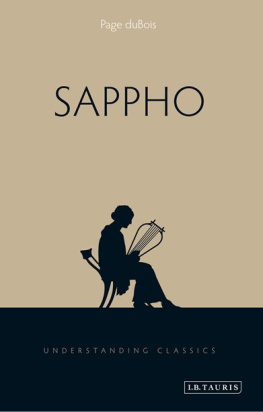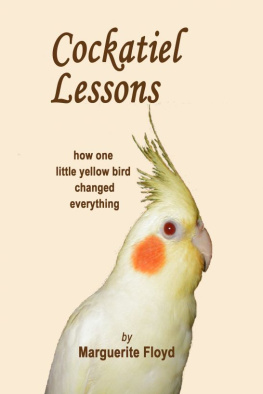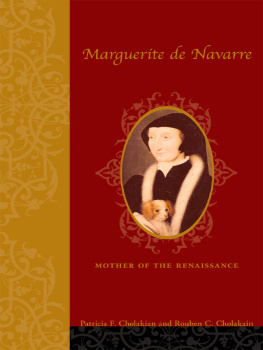Marguerite Johnson - Sappho
Here you can read online Marguerite Johnson - Sappho full text of the book (entire story) in english for free. Download pdf and epub, get meaning, cover and reviews about this ebook. year: 2007, publisher: Bloomsbury UK, genre: Non-fiction. Description of the work, (preface) as well as reviews are available. Best literature library LitArk.com created for fans of good reading and offers a wide selection of genres:
Romance novel
Science fiction
Adventure
Detective
Science
History
Home and family
Prose
Art
Politics
Computer
Non-fiction
Religion
Business
Children
Humor
Choose a favorite category and find really read worthwhile books. Enjoy immersion in the world of imagination, feel the emotions of the characters or learn something new for yourself, make an fascinating discovery.

- Book:Sappho
- Author:
- Publisher:Bloomsbury UK
- Genre:
- Year:2007
- Rating:3 / 5
- Favourites:Add to favourites
- Your mark:
- 60
- 1
- 2
- 3
- 4
- 5
Sappho: summary, description and annotation
We offer to read an annotation, description, summary or preface (depends on what the author of the book "Sappho" wrote himself). If you haven't found the necessary information about the book — write in the comments, we will try to find it.
Sappho — read online for free the complete book (whole text) full work
Below is the text of the book, divided by pages. System saving the place of the last page read, allows you to conveniently read the book "Sappho" online for free, without having to search again every time where you left off. Put a bookmark, and you can go to the page where you finished reading at any time.
Font size:
Interval:
Bookmark:
Sappho
ANCIENTS IN ACTION
Catullus
Amanda Hurley
Cleopatra
Susan Walker and Sally-Ann Ashton
Horace
Philip Hills
Lucretius
John Godwin
Ovid: love songs
Genevieve Liveley
Ovid: myth and metamorphosis
Sarah Annes Brown
Sappho
Marguerite Johnson
Spartacus
Theresa Urbainczyk
ANCIENTS IN ACTION
Marguerite Johnson

Bloomsbury Academic
An imprint of Bloomsbury Publishing Plc
50 Bedford Square | 1385 Broadway |
London | New York |
WC1B 3DP | NY 10018 |
UK | USA |
www.bloomsbury.com
First published in 2007 by Gerald Duckworth & Co. Ltd.
Reprinted by Bloomsbury Academic 2013
Marguerite Johnson 2007
Marguerite Johnson has asserted her right under the Copyright, Designs and
Patents Act, 1988, to be identified as Authors of this work.
All rights reserved. No part of this publication may be reproduced or transmitted in
any form or by any means, electronic or mechanical, including photocopying,
recording, or any information storage or retrieval system, without prior
permission in writing from the publishers.
No responsibility for loss caused to any individual or organization acting on or
refraining from action as a result of the material in this publication can be
accepted by Bloomsbury or the author.
British Library Cataloguing-in-Publication Data
A catalogue record for this book is available from the British Library.
eISBN-13: 978-1-4725-3867-3
Library of Congress Cataloging-in-Publication Data
A catalog record for this book is available from the Library of Congress.
For my sister, Kathleen, with love.
I am grateful to the following for their comments on the draft of the manuscript: Frances Muecke (University of Sydney), Terry Ryan (University of Newcastle), and David McLean.
Colleagues at the University of Adelaide, particularly Jacqueline Clarke, were welcoming and supportive during my sabbatical stay there during October 2005.
Thank you also to Antony and Rebis Music for permission to use the lyrics from the album, I am a bird now.
All translations unless indicated otherwise are my own. Texts and emendations of Sappho are based on those by Denys Page (Clarendon Press: 1955) and D.A. Campbell (Harvard University Press: 1990).
*
In translations of Sapphos work, parentheses denote suggested emendations to partially illegible sections of the text; ellipses mark damaged parts of the text; and square brackets are used to facilitate the meaning where necessary.
Most of the references contained in the Notes are cited in the Select Bibliography, except for material dealing with textual issues, or topics of limited general interest to Sapphic studies per se.
Hope Theres Someone
So heres hoping I will not drown
Or paralyze in light
And godsend I dont want
to go To the seals watershed
Spiralling
Where go
where now
Cant stand
and if I can
Cant die
Im freezing
Sly curse
Im spiralling
Antony and the Johnsons,
Rebis Music (2004)
It is an auspicious event when a discovery is made that sheds new light on the world of ancient literature. It is especially propitious that in the year preceding the writing of this book a new papyrus was found that has contributed to the scarce remains of the poetry of Sappho. Researchers Michael Gronewald and Robert Daniel, working in the archives of Cologne University, discovered a document, dated to the third century BC and originally part of a mummy cartonnage, which records quotations from three of Sapphos poems. The second quotation, when combined with a previously preserved fragment from Oxyrhynchus (found in 1922), resulted in a complete work, poem 58. In 2004 Gronewald and Daniel published two articles on the fragments in the academic journal Zeitschrift fr Papyrologie und Epigraphik. Martin West then published the new poem in the original Greek with an English translation in the Times Literary Supplement on 21 June 2005, thus introducing the discovery to a wider audience.
Poem 58 tells of Sapphos emotional response to growing old and begins with an address to the young:
Be passionate for the beautiful gifts of the fragrant-breasted Muses,
o children, and for the clear, sweet-singing lyre.
Old age has now seized my once-tender body;
my hair has become light instead of dark;
my heart has grown heavy; my knees refuse to support me,
which once upon a time were as lithe for the dance as fawns.
I often mourn this state; but what am I to do?
There is no way, being human, not to grow old.
They say that rosy-armed Dawn, mad with love,
once carried Tithonus to the end of the world;
beautiful and youthful then, but in time grey age
engulfed him, he the husband of a goddess.
It is evident that Sapphos poetry speaks to us for the very reason that she is capable more than capable of succinctly conveying the human condition. The pain, both emotional and physical, of growing old is suggested in the advice addressed to adolescents to revel in the gifts of artistic endeavour, here personified by the Muses, goddesses who inspire music and poetry. In these opening lines, we sense Sapphos sorrow at the passing of her own youth, the impression being confirmed by lines 3-8 in which she describes the ageing process and its effects. Sappho then recalls the myth of Tithonus, the beautiful mortal who became the object of desire of Dawn, goddess of the morning light, who snatched him away to Olympus, home of the gods, to live with her. As Sappho and her ancient audience knew, the tale is a tragic one: Dawn, who ensured Tithonus eternal life, forgot to ensure eternal youth. Horrified at his ageing body Dawn locked Tithonus away to languish alone forever.
West observes that the fragment is resoundingly indicative of Sapphos poetic skill: The poem is a small masterpiece: It seems, nevertheless, that Greer is in the minority on this issue, with modern enthusiasm for the genius of Sappho, evidenced by the praise of West, matching the admiration of antiquity. In an epigram attributed to Plato (c. 427-348 BC), for example, she is referred to as the Tenth Muse:
Some say there are nine Muses. How imprudent!
Note well: Sappho of Lesbos is the tenth!
These lines indicate the respect the men of antiquity had for Sappho, which was somewhat unusual, since women did not earn admiration easily, except in the realms of beauty, chastity, motherhood and housekeeping.
There were also staunch male critics of Sappho and while none of them attacked her poetry, they certainly scrutinised her personal life. One example of this criticism is reflected in an anonymous biographical passage dating from the second or third century BC:
Some have accused her of being irregular in her ways and a lover of women. In appearance she seems to have been contemptible and exceedingly ugly, being dark in complexion and of a considerably small stature.
This extract reveals much about the ancient view of women who were reputed to be attracted to other women. Indeed males were able to court and become intimately involved with other males, while women who were inclined towards their own sex were generally vilified.
Next pageFont size:
Interval:
Bookmark:
Similar books «Sappho»
Look at similar books to Sappho. We have selected literature similar in name and meaning in the hope of providing readers with more options to find new, interesting, not yet read works.
Discussion, reviews of the book Sappho and just readers' own opinions. Leave your comments, write what you think about the work, its meaning or the main characters. Specify what exactly you liked and what you didn't like, and why you think so.










